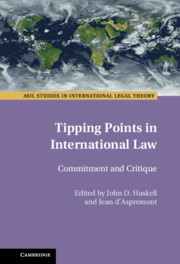Book contents
- Tipping Points in International Law
- ASIL Studies in International Legal Theory
- Tipping Points in International Law
- Copyright page
- Contents
- Contributors
- Acknowledgments
- 1 Experiencing Tipping Points in International Law
- 2 The Literary Performances of the Tipping Point
- 3 Authoritarianism
- 4 China
- 5 Democracy
- 6 Development
- 7 Digital
- 8 Environment
- 9 Health
- 10 Human Rights
- 11 Labor
- 12 Liberation
- 13 Multilateralism
- 14 Race
- 15 Religion
- 16 Rule of Law
- 17 Russia
- 18 Systems
- 19 Territory
- 20 United Nations
- 21 Universalism
- Index
14 - Race
Published online by Cambridge University Press: 23 October 2021
- Tipping Points in International Law
- ASIL Studies in International Legal Theory
- Tipping Points in International Law
- Copyright page
- Contents
- Contributors
- Acknowledgments
- 1 Experiencing Tipping Points in International Law
- 2 The Literary Performances of the Tipping Point
- 3 Authoritarianism
- 4 China
- 5 Democracy
- 6 Development
- 7 Digital
- 8 Environment
- 9 Health
- 10 Human Rights
- 11 Labor
- 12 Liberation
- 13 Multilateralism
- 14 Race
- 15 Religion
- 16 Rule of Law
- 17 Russia
- 18 Systems
- 19 Territory
- 20 United Nations
- 21 Universalism
- Index
Summary
During spring and summer of 2020, there was an increased emphasis in the United States on racial issues due to the tragic death of African American George Floyd by members of the Minneapolis, Minnesota police force. Protests that began in the United States in more than 140 cities expanded to many other countries in the world, with denunciations of racism in those nations being trumpeted as well. In addition to the refrain “Black Lives Matter” and “I can’t breathe” coming from the global streets, numerous businesses, universities, sports teams, governments, and nongovernmental organizations issued statements pledging antiracist behavior, new programs, and sometimes additional resources.
- Type
- Chapter
- Information
- Tipping Points in International LawCommitment and Critique, pp. 244 - 262Publisher: Cambridge University PressPrint publication year: 2021

